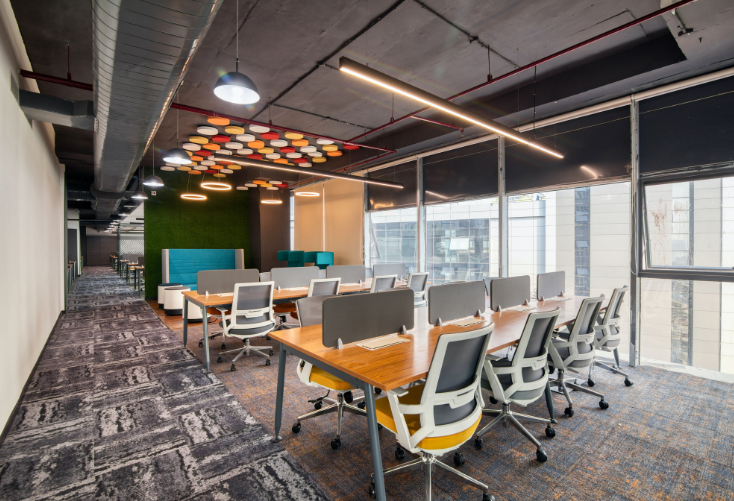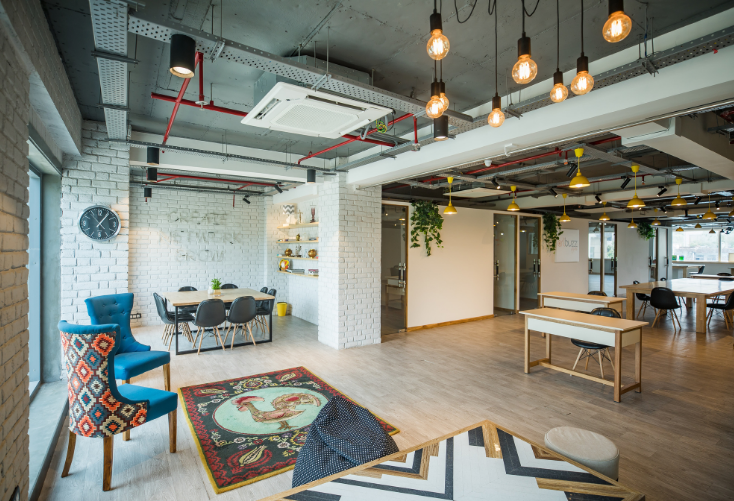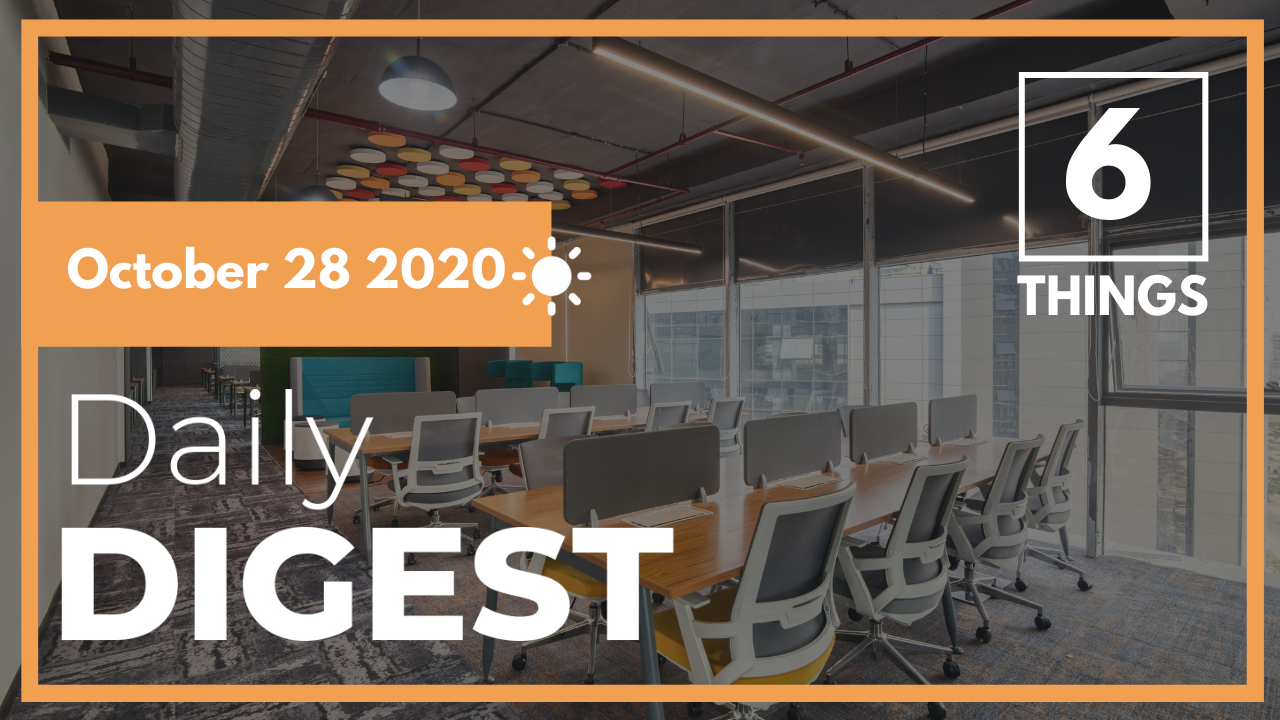Hand selected flexible workspace news from the most reliable sources to keep you ahead of the pack. We find all the latest news, so you don’t have to. Morning and afternoon updates. Stay in the know.
Here’s what you need to know today:
- How AI Could Create More Job Opportunities NEW
- Flexible Offices Could Help Improve Work Culture NEW
- Improving Mental Health When Working Remotely NEW
- Coworking Operator’s Wake-up Call
- Coworking Spaces Could Bounce Back
- The Hub And Spoke Model Could Become The Norm
How AI Could Create More Job Opportunities
The quality of worklife has been an emerging trend for companies over the last several years, and now, it’s gaining more traction than ever.
Today’s workforce has become accustomed to using various types of automation and artificial intelligence (AI). These technologies have quickly become staples to a company’s operations, which means certain jobs and tasks will no longer have to be done by humans.
In fact, according to a study from Stanford and Arizona State Universities, “cities with greater increases in AI-related job postings exhibited greater economic growth.”
“This relationship was dependent on a city’s ability to leverage its inherent capabilities in industry and education to create AI-based employment opportunities,” the study read.
AI can also be utilized to train and upskill workers to prepare them for the future of the workforce. This can be accomplished by using algorithms that create curated training programs for employees to build off of their recurrent skill sets.
Despite the misconception that automation and AI decreases job opportunity, it may actually prompt a huge spike in new positions. In fact, according to WEF’s Future of Jobs Report, 97 million jobs may be created by AI over the next five years.

Flexible Offices Could Help Improve Work Culture
Companies have addressed the challenges that come with nurturing workplace culture when operating remotely. But as organizations move towards adopting flexible and hybrid working arrangements, it could become easier for them to create a culture that values community.
When working remotely, it becomes immensely more difficult to support workplace culture, which leads to companies suffering from low retention, attraction and engagement rates.
However, through the use of flexible workspaces, businesses have the ability to broaden their talent pool and showcase that they value the employee experience.
Over the last several months, many women have been forced to leave their jobs to fulfill personal and family responsibilities. The use of flexible workspaces could help them return to the workforce and provide them a safe, healthy office to come into that is closer to their homes.
Additionally, flexible offices are often celebrated for their collaborative atmospheres. Workers are able to easily exchange ideas and boost creativity in these shared offices, which in turn helps enhance teamwork.
Flexible workspaces also make it easier to foster engagement by offering an inclusive environment where everyone has a voice. This leads to improved productivity and increased employee well-being.
Overall, organizations seeking to revamp their workplace culture throughout the uncertainty should consider adopting flexible workspaces.

Improving Mental Health When Working Remotely
According to the World Health Organization, one in four people suffer from mental illness at some point or another. This has struck a chord for companies looking to enhance the employee experience and nurture their community.
Right now, the ongoing pandemic has brought upon unprecedented levels of mental health issues to our society. So what can companies do to ensure that employees are taken care of now and in the future?
Tête-à-tête, which means “private conversation” in French, is a way to bring a small group of staffers to discuss their own mental health. Doing so can help workers air out any added stress that they may be experiencing, whether it be personal or professional, and help normalize discussing mental health in the workplace.
Additionally, offering access to counseling or therapy can help employees take better care of their mental health. While several business leaders are apprehensive to cover these costs, poor mental health costs businesses $9 billion annually.
Knowing this, investing into improving workers’ mental health means that both the employee and business see benefits.
One of the most significant challenges that distributed workforces experience is the lack of socialization. Without face-to-face interactions, employees see increased levels of isolation and loneliness.
To bring employees together, companies should attempt to recreate “water cooler” moments by hosting virtual meetups. Of course, there is no true replication of casual, in-person lunches, but creating a semblance of normalcy can help workers feel less alone.

Coworking Operator’s Wake-up Call
Cushman & Wakefield proclaimed that 2018 was the “Year of the Coworking/Flex Office Sector” after leasing activity from operators grew by 200%.
The future looked promising for the blossoming industry, but the pandemic has led millions of people to walk away from memberships and work out of their homes.
While it would be simple to pack up their bags and call it quits, flexible office firms are taking this time to reevaluate their portfolio and business operations.
According to Newmark Knight Frank’s “3Q 2020 Manhattan Office Market Report,” 23 locations equating 1.2 million square feet in the borough had closed since the start of the pandemic. The report also anticipates an additional 1.1 million square feet of subleased space will come back to Manhattan’s market due to coworking closures.
For instance, Regus has put over 100 of its locations across the country into bankruptcy, but has also extended one of its leases on Madison Avenue.
“Regus made it clear that they were identifying — as all the operators in their sector are — which are the successful locations and which aren’t as successful,” said Michael Cohen, President at Colliers International New York who represented Regus in the deal.
According to Dror Poleg, former adviser to coworking firm Breather, the trouble began when operators expanded too quickly instead of taking time to nurture the business.
Now, the pandemic has led coworking companies to completely uproot their business model to focus on what is essential: providing a safe office for workers. This means cutting down on unnecessary locations that are not working, as well as renegotiating leases.

Coworking Spaces Could Bounce Back
In March, many countries around the world entered some form of lockdown or restrictions in order to mitigate the spread of COVID-19. This led companies to close their offices and shift their workforce to remote working positions.
Coworking spaces that were once buzzing with collaboration and creativity had become ghost towns, and operators were forced to plan their next big move.
Despite coworking companies seeing a 50% drop in footfalls in India, the industry may be on the cusp of making a comeback. Now, major organizations are looking into adopting flexible workspaces in lieu of their lavish, expensive offices.
The industry’s attempt to become a reliable work alternative could line up well with the “work from anywhere” trend that will likely emerge after the pandemic has ended.
Flexible offices are expected to be the ideal choice for corporations looking to de-densify their main offices, cut down on overhead costs and provide employees with more say in when and where they work.
“The company can help businesses and educational institutions de-densify their spaces,” said Karan Virwani, CEO of WeWork India. “Corporate clients contribute around 65-70% of the business and it will remain so going forward.”
However, this transition will have to come with major adjustments to the normal flexible office model.
These spaces are known for being dense, with occupants sharing amenities. Instead, operators will need to emphasize the importance of distancing, sanitation and cleanliness, all while nurturing community and collaboration.

The Hub And Spoke Model Could Become The Norm
According to research by recruitment firm Robert Walters, over one-third of business leaders are looking to adopt a “hub and spoke” model.
“The Future of Work in UK & Ireland” report reveals that this business model meets both the needs of employers and employees.
With many employees expected to continue working remotely after the pandemic, companies need to accommodate these changes and offer office spaces closer to employees’ homes.
Some workers have expressed the desire to return to the office for at least part of the week. With this model, employees would have the choice to work out of a main central office (the “hub”), or a dedicated spoke location.
The hub would continue serving as the face of a company’s brand and would be used for large team meetings, but the spokes would consist of smaller, more agile offices on the outskirts of cities.
The spoke offices would be modeled similarly to a coworking space, which means they will be fully outfitted and operate on short-term leases.
“With more and more companies becoming comfortable with their employees working from home, it will become the norm for a HQ to only have around 30% of employees working from there on a day-to-day basis,” said Sam Walters, director of Robert Walters London. “Spokes or regional offices will work in that they aim to address all of the employees concerns around flexibility, commute time, cost of travel, and work-life balance, whilst still allowing companies to train, motivate & monitor employees productivity on-site.”


















